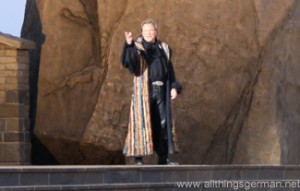
I had only been living in Germany for a year and although I was aware of the significance of whose computer I was looking at in terms of how important the customer was for my employer, only recently have I discovered the significance of the person behind it for the former East Germany’s show business industry. This I have to thank to his autobiography Lippi-Bekenntnisse.
Rather than being just another autobiography of a German celebrity, Lippi-Bekenntnisse gives an inside look into the way that the entertainment business worked in the GDR from someone who was part of it in quite a unique way. Reading it made me realise how little I know about that part of Germany’s history.
When I was studying German in the 1990s re-unification had only just taken place. I had a lecturer who was a specialist for the GDR and whose course on the country I took. However on reflection, I think that we learnt a lot about the politics and maybe the economy of the country. At least, we probably learnt whatever was known about it at that time as far as Universities in the UK were concerned.
Only later, since I have been living in Germany, have I learnt more about the GDR’s culture like Ost-Ampelmännchen (East German traffic lights), the Sandmännchen, or about sporting events like the 1974 World Cup match between East and West Germany (which incidentally the East won 1-0).
Through Lippi-Bekenntnisse I have now learnt about music groups like the Puhdys and television shows like Glück muß man haben.
But I have also learnt more about the bureaucracy of the GDR, such as the occupation “Staatlich anerkannter Moderator” (official approved presenter), and that it was even possible for East German presenters and singers to travel to the West to perform – with sufficient permission – and how the payment for such performances worked.
Wolfgang – Lippi to his fans, hence the title of the book – talks about how difficult it was to get that permission, but also about simple things like having his first autograph cards printed. Before bringing the story up to the present day, he also talks about where he was on the night that the Berlin Wall came down – and it wasn’t in Berlin!
The years after re-unification only have a small part to play in the book, which is a shame on the one hand, because I would have liked to have read more about that time as well. But the fact that three quarters of the it takes place during the days of the GDR is actually what makes the book so appealing, not just for fans, but for anyone interested in or even studying that part of Germany’s history.
Buy “Lippi-Bekenntnisse” at Amazon.de





Speak Your Mind